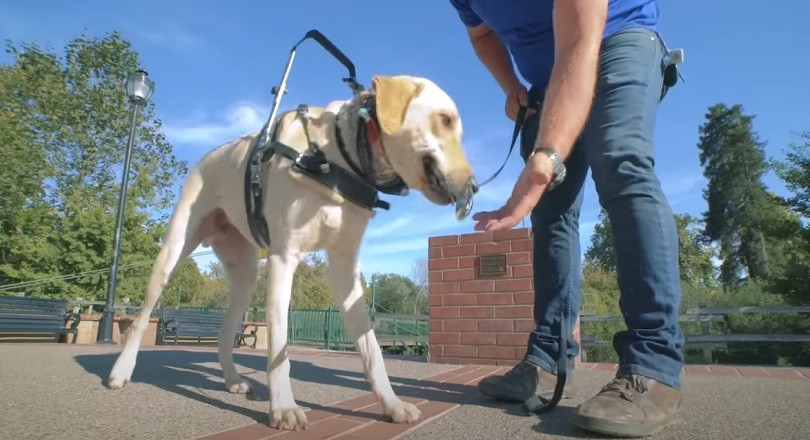Last Updated on February 28, 2025
You cannot legally ask for proof of a service dog. You can only ask if the dog is a service animal.
Service dogs play a crucial role in assisting individuals with disabilities. These highly trained animals help perform tasks that their handlers cannot do independently. Understanding the legalities surrounding service dogs is essential for businesses and the general public. The Americans with Disabilities Act (ADA) provides clear guidelines on what can and cannot be asked regarding service animals.
Knowing these rules ensures compliance and respect for individuals relying on these indispensable companions. Familiarize yourself with these regulations to foster an inclusive environment and avoid potential legal issues.
Service Dogs And The Law

Understanding the laws surrounding service dogs can be confusing. People often wonder if they can legally ask for proof of a service dog. This section covers the most important legal aspects of service dogs and their rights.
Americans With Disabilities Act (ADA) Guidelines
The Americans with Disabilities Act (ADA) sets clear rules. Under the ADA, a service dog is a dog that is trained to perform tasks for a person with a disability. The ADA protects the rights of people with disabilities to have their service dogs with them in public places.
According to the ADA, you can ask only two questions:
- Is the dog a service animal required because of a disability?
- What work or task has the dog been trained to perform?
Businesses cannot ask for documentation. They also cannot require the dog to demonstrate its task or inquire about the person’s disability.
Federal Vs. State Regulations On Service Animals
Both federal and state laws protect service dogs. Federal laws, like the ADA, provide a baseline of protection. States can have their own additional rules.
| Federal Law | State Law |
|---|---|
| ADA Guidelines | Varies by state |
| This may include housing and employment laws | May have more specific rules |
| Protects access to public places | May include housing and employment laws |
Some states require service dogs to be registered, but not all. Check your state’s specific laws to be sure.
Remember, federal law always takes precedence. State laws cannot reduce the protections of federal law. They can only add to them.
Verifying A Service Dog
Service dogs play a crucial role in assisting individuals with disabilities. They perform tasks that help their owners lead more independent lives. But how can you verify if a dog is a legitimate service dog? Here, we break down the permissible questions and prohibited practices.
Permissible Questions To Identify Service Dogs
According to the Americans with Disabilities Act (ADA), you can ask two specific questions:
- Is the dog a service animal required because of a disability?
- What work or task has the dog been trained to perform?
These questions help determine if the dog is a legitimate service animal. They focus on the dog’s duties, not the owner’s disability.
Prohibited Practices In Service Dog Verification
You cannot ask for any documentation for the dog. This includes certification papers or proof of training. You also cannot ask the owner to demonstrate the dog’s tasks.
Additionally, you cannot inquire about the person’s disability. This is private information and protected by law.
Respect and privacy are key. Always treat individuals and their service dogs with respect.
Business Owners’ Rights And Responsibilities
Understanding your rights and responsibilities as a business owner is crucial. This ensures that you comply with the law and provide excellent service. Knowing how to handle service dogs is a part of these responsibilities. Let’s explore the key aspects to consider.
Handling Service Dog Access In Public Places
Business owners must know how to handle service dog access. You cannot ask for documentation proving a service dog’s status. The Americans with Disabilities Act (ADA) protects service dogs and their handlers. You can ask only two questions:
- Is the dog a service animal required because of a disability?
- What work or task has the dog been trained to perform?
These questions help you verify the dog’s purpose without invading privacy. Always treat handlers and their dogs with respect.
Legal Consequences Of Improper Service Dog Inquiry
Improper service dog inquiries can lead to legal consequences. Violation of ADA guidelines can result in:
- Fines and penalties.
- Potential lawsuits.
- Negative publicity for your business.
Ensure your staff is trained on ADA regulations. This prevents improper inquiries and legal issues. Respect and knowledge are your best tools.

Frequently Asked Questions
Can Someone Ask Me For Papers On My Service Dog?
No, businesses can only ask if your dog is a service animal and what tasks it performs. They can’t demand papers.
What Is The New Law In Texas About Service Dogs?
The new Texas law requires service dogs to be specifically trained to assist individuals with disabilities. Handlers must carry proof of the dog’s training. This ensures only legitimate service dogs access public spaces.
What Are The Three Questions You Can Ask About A Service Dog?
1. Is the dog a service animal required because of a disability? 2. What tasks or work has the dog been trained to perform? 3. Is the service dog trained to assist with a specific disability?
How Can You Tell A Real Service Dog From A Fake?
Look for a service dog vest, ID tags, and well-behaved behavior. Real service dogs remain calm and focused.
Can Businesses Ask For Proof Of Service Dog?
No, businesses cannot ask for proof but can ask two specific questions.
Conclusion
Understanding the legalities of asking for proof of a service dog is crucial. Respect privacy and follow ADA guidelines. Always approach the situation with sensitivity. This ensures compliance and promotes inclusivity. By being informed, you contribute to a more understanding and lawful community.




